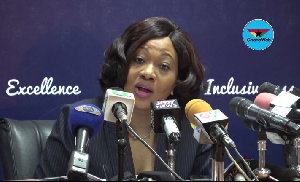The Electoral Commission (EC) appears to be set for the implementation of the controversial Representation of the People’s Amendment Act (ROPAA).
The EC Chairperson Jean Mensa on Thursday inaugurated ROPAA Consultative and Implementation Committee.
The nine-member committee is made up of three representatives from the EC, Peace Council, Civil Society Organisation, academia, one each from the ruling party and the main opposition party, while the minority parties were to nominate one representative.
The committee is chaired by Dr Eric Bossman Asare, Deputy Chairman, EC in charge of Corporate Services, with Christian Owusu-Parry, EC Director of Administration as the Secretary.
Other members of the committee include Adwoa Abrefa Asuaman, EC member; John Boadu, General Secretary of the New Patriotic Party (NPP) and Dr Benjamin Kunbuor, a leading member of the National Democratic Congress (NDC).
The rest are Reverend Dr Ernest Adu Gyamfi of the National Peace Council, Professor Ransford Gyampo of the University of Ghana and Dr Kojo Asante of the Centre for Democratic Development (CDD) Ghana.
The other minority parties, however, failed to agree on a common representative.
They were tasked to meet later and present their representative to the EC.
The committee shall commence sitting in January 2019 and shall present its final report to the commission by May 31, 2019.
On the terms of reference of the committee, Mrs Mensa tasked the committee to do a “desk research” on countries that were implementing ROPAA and how it was being implemented in those countries.
The committee is also to hold regional consultative meetings, pay working visits to countries already practising external voting namely Mali, South Africa, the United States and the United Kingdom.
It has been mandated to undertake stakeholder consultations with a view to seeking the opinion of key stakeholders on the best approach to the implementation of ROPAA.
She said the implementation of ROPAA requires that the commission puts together regulations, in the form of a Constitutional Instrument (CI) to regulate registration of voters and the conduct of elections in foreign countries.
Mrs Mensa said at the end of the work of the ROPAA Consultative and Implementation Committee, a technical group would be constituted to draft regulations for external voting and would eventually be passed into a CI by Parliament by the close of December 2019.
The EC Chairperson said ROPAA today gives the Ghanaian citizens living outside the country the right to be registered as voters and to vote where they live.
“It has been 12 years since ROPAA became law, but Ghanaian citizens living outside the country are yet to benefit from the opportunities presented by ROPAA.
“This is because of the obvious challenges that are likely to be encountered in the implementation of ROPAA,” she said.
Mrs Mensa said that in the past, attempts were made by the EC, under the leadership of Dr Kwadwo Afari-Gyan, to find a way of implementing ROPAA that would be acceptable to all stakeholders by setting up a committee in 2011 to make recommendations for the ROPAA implementation.
“Seven years on, the right to be registered as a voter and to vote in public elections and referenda remains elusive to the Ghanaian living outside Ghana.
“Earlier, the Human Rights Court in Accra in the case of Kofi Boateng, PHD; Agyenim Boateng, SJD and others versus the EC and the Attorney-General ordered the Commission to take steps to implement ROPAA,” she said.
Mrs Mensa said a lot had changed since the committee set up by Dr Afari-Gyan presented its report, stating that it was necessary that in trying to implement ROPAA now, stakeholders take into account the new developments in Ghana’s electoral process.
She said it was for this reason that the Consultative and Implementation Committee was being formed to continue with the process after it was put on hold from 2011.
Dr Asare said the implementation of ROPAA was an exercise that would help advance Ghana’s democratic credentials.
It would be recalled that following advocacy by interest groups, a bill was introduced in Parliament in 2006, the Representative of the People Amendment Bill (ROPAB), to amend the representation of the People’s Law of 1992 PDNC Law 284.
PNDC Law 284 did not make provision for Ghanaian citizens other than person working in Ghana’s diplomatic missions, persons working with international organisations of which Ghana is a member and Ghanaian students on government scholarship to be registered in the countries where they reside.
The ROPAA, Act 2006, ACT 699, was therefore passed to extend the right to participate in voting in public elections and referenda to Ghanaians living outside Ghana.
General News of Saturday, 22 December 2018
Source: dailyguideafrica.com













